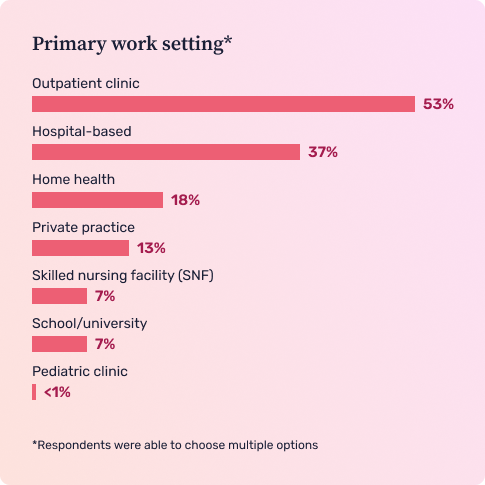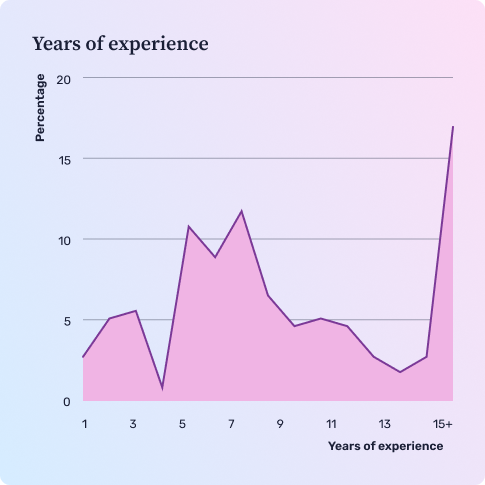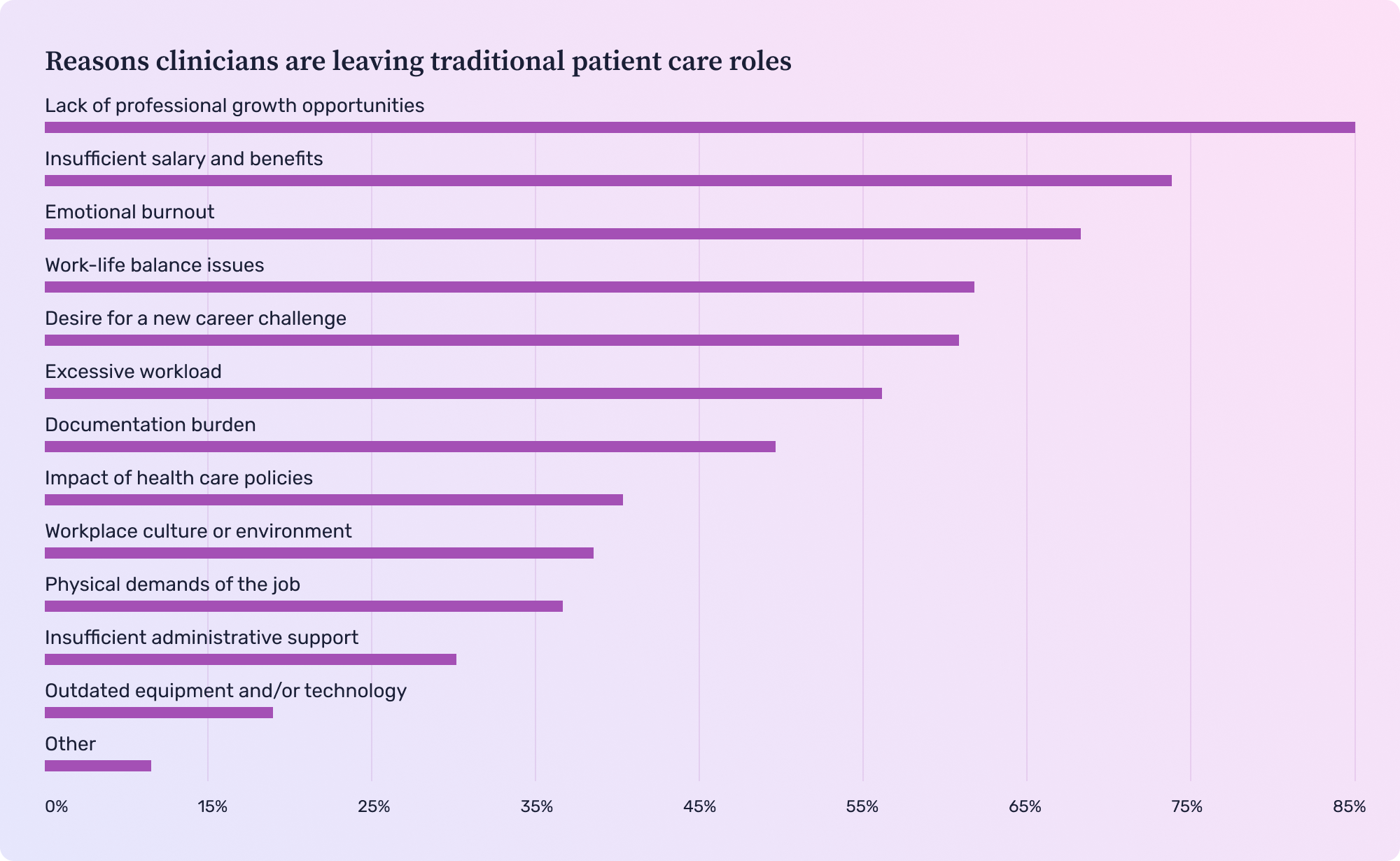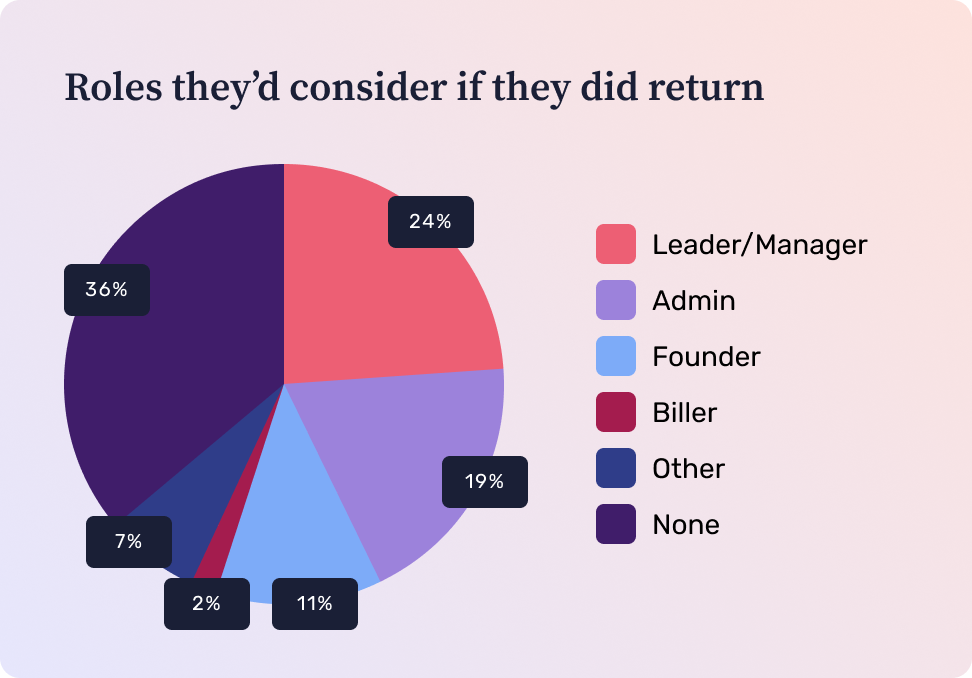See Prompt in action!
Thank you! Your submission has been received!
Oops! Something went wrong while submitting the form.


A survey to better understand why PTs and other rehab therapists are transitioning away from traditional patient care.
Prompt recently conducted a survey to better understand why physical therapists and other rehab clinicians are leaving outpatient care for non-clinical roles.
Why? Staffing is the number-one challenge facing rehab therapy businesses, and we hear more stories about it each day. The reduced candidate pool makes the hiring search increasingly competitive for understaffed practices.
In our survey, we asked clinicians who have transitioned out of the traditional care setting or are considering doing so why they are deciding to make a change, among other things. We’ve summarized the findings below.
Prompt conducted this survey from May 14-24, 2024, and collected 215 responses. Respondents were members of The Clinician Transition, an online community for rehab therapists (PTs, OTs, SLPs) who are either considering a nontraditional role or have already taken one.
Survey respondents were predominantly female (83%), followed by male (16%) and non-binary (<1%). The largest age group was 30-39 (62%), followed by 40-49 (20%), under 30 (13%), and 50-59 (5%). Responses were distributed evenly across levels of experience, ranging from 1 year to 15+ years in traditional care. Respondents were split fairly evenly between still having a role in traditional care (52%) and having already transitioned (48%).


When asked for their primary reasons for leaving the field of traditional care, clinicians reported lack of professional growth opportunities, desire for higher salaries, burnout, and difficulty balancing work and home life. Note: They were able to choose multiple answers.

Many respondents called out declining/stagnant reimbursements rates, low reimbursement payers, and the profession’s overall reliance on insurance reimbursements for adequate pay as frustrations with traditional care.
In their open-ended responses, clinicians went into more detail about topics that contributed to their decisions to leave the profession. They shared their thoughts on limited career growth opportunities, insufficient pay for their work, and a lack of respect from leadership, among others.





Clinicians reported unrealistic work demands, less focus on patients, documentation struggles, and frustrations with inefficient technology as burnout contributors.






When asked “What do you/did you like most about traditional patient care?,” many respondents shared their positive experiences getting to know and helping patients, as well as building connections with their team.




Customer success and product/program/project management are the top fields that rehab therapists are transitioning toward after traditional care.

The top 5 alternative career paths mentioned* were customer success (52%), product/project/program management (49.75%), healthcare quality (38%), sales (30%), and data analysis (25%).*Respondents were allowed to choose multiple options

We asked those clinicians that had successfully transitioned out of the field if there was a different role they’d consider if they ever returned to traditional rehab therapy.
From those that responded, 24% said they’d consider a leadership role, followed by admin (19%), founder (11%), and biller (2%). Around 36% said there wasn’t a different role they would consider.
When asked the most appealing aspects of non-traditional roles, “time flexibility,” “ability to work remotely,” and “better growth/pay potential” were often mentioned.
89% of respondents are detractors of the profession (reporting 6 or less out of 10 on the question, “How likely are you to recommend a career in traditional care?”)
34% of respondents who have already transitioned away from traditional care reported they are highly unlikely to return to a traditional care role in the future.
Respondents shared some suggestions for how practice leaders could improve their businesses to help retain clinicians. These included building more time into provider schedules for unique projects and career development, and a greater focus on quality over quantity of patient visits.






Clinicians also offered some ideas for improving the rehab therapy industry as a whole. These included a desire for less dependence on the reimbursement model and more general business education in school.





There are some pressing themes from these answers that are hard to ignore – and for the future of PT, owners and decision-makers across the industry need to address them. Consider the following:
Practice leadership teams need to be creative in finding ways to overcome reimbursement struggles. Running more efficiently, ensuring error-free billing, and scheduling out patients more intentionally can help battle margin compression and offer higher base salaries. Incentive-based structures could also be considered for rewarding high-performers and giving them a sense of upward mobility.
It’s worth considering that providers in the 30-39 age group reported compensation as the biggest issue for them, while those below 30 and over 40 reported “lack of growth opportunities” as their top reason for leaving.
Owners and managers should stay aware of the possible mental toll their teams are experiencing. Leadership should create open-door policies to discuss issues, and provide resources and job flexibility that can benefit the well-being of providers and support staff alike. They should also solicit feedback about work demands or aspects of the business that contribute to burnout and work together on solutions. Find tips for preventing staff burnout here.
They help create a foundation for operating smoothly, maximizing reimbursements, and eliminating common headaches in provider tasks – which can not only lower stress but allow clinicians to help more patients and maintain a sustainable work-life balance.
Thank you to The Clinician Transition group for partnering with us on this survey, and for all the respondents who took time to share honest answers.
We are committed to a brighter future in rehab therapy, and offering technology that can help clinics deliver better care is just one part of that.
We look forward to the positive impact(s) this report can have across the industry.
Help your practice grow
From intake to insights, Prompt is the all-in-one platform you need